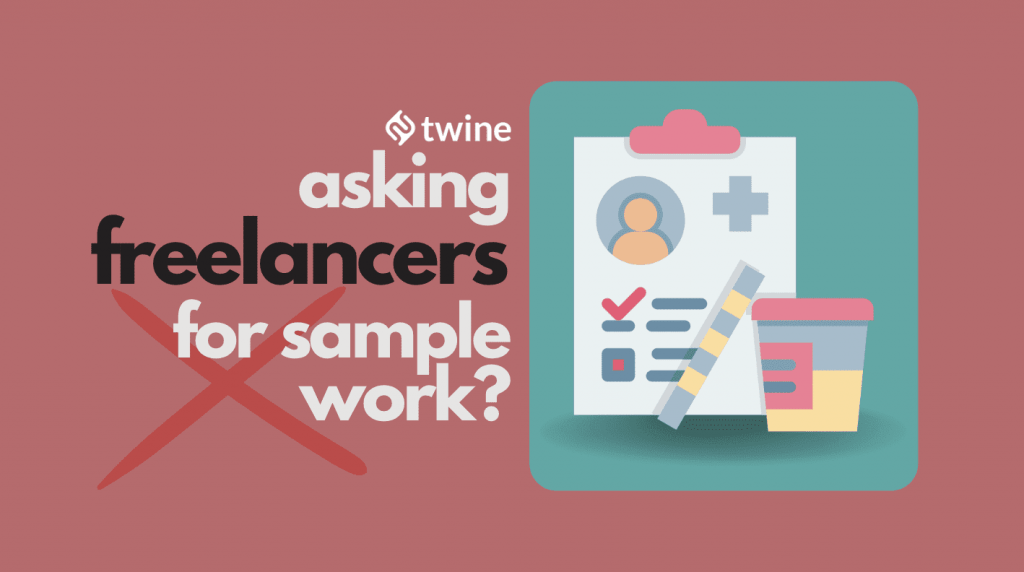
“Can you provide some sample work?” It’s a straightforward enough question. So, what’s the big deal?
This question is one of the most contentious in the entire freelance industry. Every freelancer will be asked this at least once in their career. And every time, it sends shivers down the spine of even the most self-respecting freelance professional.
So what is sample work? Sample work, work on spec, pro bono, contests – call it what you want, it’s all the same.
We’re talking about work done for free.
Clients will ask freelancers to produce some or all of the project for free, upfront, without payment. Sometimes, there is the promise of payment if it all goes well. More often than not, this never materializes.
Need assistance with that latest project? Take a look at the skills we provide…
Why Clients Ask For Sample Work

Unfortunately, clients continue to ask for sample work. Even when this practice is loathed by freelancers everywhere.
And it’s easy to see why, especially if the client has only just started working with freelancers.
They’re probably nervous about working with a new freelancer. They don’t understand the process. They’re worried they won’t get what they want.
Working with a new freelancer can be daunting. So, it seems logical to ask for work upfront before they pay for it. After all, you can test drive a new car before you buy it, right? So, what’s the harm?
Well, a car can easily be sold to another customer if you don’t like it. The work the freelancer created is specific to you, and can’t ever be used again. It’s now useless, and you just cost them their time and money.
Why Sample Work is Bad for Freelancers

Every good freelancer everywhere already has work that you can test drive. Introducing: the portfolio.
A freelancer’s portfolio is full of work they’ve already completed for other clients. Their portfolio will give you a good idea of what they’re capable of and the kind of work they can produce. You should decide whether you want to hire them based on this work, rather than sample work.
Think about it, doing sample work for clients is a huge risk for freelancers. What happens if the client doesn’t like it, and won’t pay? The freelancer has subsequently wasted hours/days/weeks of their time. They’ve lost money.
Even if the client does like the work, it doesn’t guarantee they will be paid.
What’s to stop the client from just taking the work and using it anyway without paying up? This happens more often than you think and makes freelancers fearful of clients that ask for this…
Why Sample Work is Bad for Clients

By now, you’re probably getting the idea that freelancers don’t like to be asked to do sample work.
Not only is it bad for the freelancer, but it’s also bad for you, the client.
“Getting work for free, with no strings attached – what could be bad about that?” you may well ask. As it turns out: a lot.
Ever heard the phrase, if it looks too good to be true, it probably is? That definitely applies to any sample work you receive from a freelancer.
Do you want an awesome, bespoke, handmade project? And you expect this professional freelancer to do it for free before you even pay them a penny?
Really? Were you born yesterday?
This brings to mind another overused phrase to bear in mind: you get what you pay for. There are plenty of freelancers out there who will do sample work, but, it’s not going to be good.
A professional with bills to pay and mouths to feed won’t spend precious time honing away at a project they won’t get paid for.
High risk, no reward
More often than not, your sample work won’t be a true reflection of what your freelancer is capable of. There’s such a high risk involved in undertaking it, so they’ll want to spend minimal time on it. You will get rushed, sloppy work, as a result.
You’ll take one look at it and say “no thanks” – which is a waste of time for both you and the freelancer.
Even worse, there’s a high chance any sample work you receive for free is plagiarised.
Freelancers who do lots of sample work churn out copied, unoriginal and unprofessional stuff. It could be a sample that they send to hundreds of clients. Don’t be surprised when your original company logo is cropping up all over the place.
Or, they could have just outright ripped off the work from someone else. Which could put you in a dangerous position, where you are liable for copyright infringement.
The Verdict

It’s true that in the past asking for sample work used to be commonplace for freelancers. But, too many clients made off without payment, so this practice broke down.
These days, if you ask for sample work, the freelancer will assume you’re after something for free. They’ll turn you down because they believe you don’t value their skills. You could damage a lot of potential relationships with talented freelancers this way.
It’s natural to feel nervous about working with a new freelancer. But, there are ways to overcome this without asking for sample work.
View their portfolio. Discuss your requirements with your freelancer. If you can’t meet up face to face, have a Skype chat. If you’re still concerned, use milestone payments. This means you ask them to complete a small part of your project. If you don’t like what they’ve done so far, pay them for their time and move on.
Want to learn more about working with freelancers? Download our free Ebook.
Ready to hire? Our marketplace of over 410,000 diverse freelancers has the skills and expertise needed to skyrocket your business. From marketers to designers, copywriters to SEO experts – browse the talented bunch here!



